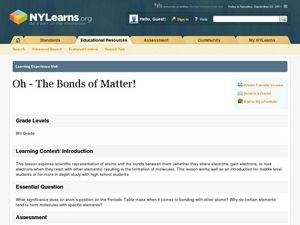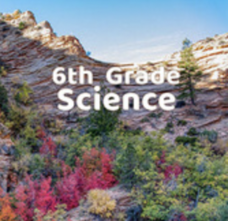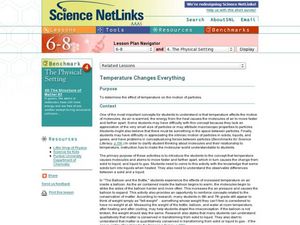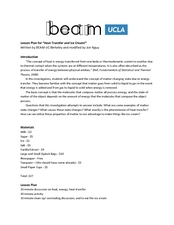Curated OER
Gas Laws and Alka-Seltzer Rockets
Students investigate the Ideal Gas Law. For this three states of matter lesson, students create Alka-Seltzer rockets using film canisters. Students record observations and data according to the scientific method and explain the gas...
Curated OER
Solids, Liquids, Gases
There are three states of matter, liquid, solid, and gas. Each are covered briefly in this very short presentation. The energy cycle is depicted in a chart and the states of matter are defined but this isn't a complete or...
Pearson
The Chemical Context of Life
An educational presentation includes atoms, molecules, the four major elements, as well as neutrons and protons. Additionally, slides focus on atomic number, mass number, atomic weight, polar and nonpolar covalent bonding, ionic...
Scholastic
Study Jams! Atoms: Protons, Neutrons, Electrons
What's smaller than a kiwi seed? Atoms! Basic atomic structure is detailed for beginning chemists in a light-hearted animation. Protons and neutrons are explained as part of the nucleus, and so are electrons that encircle the nucleus....
Curated OER
Making Molecules
In this making molecules worksheet, students complete a table of elements with their symbol, atomic number, atomic mass, number of protons, number of electrons, period and group. Students then make models using pipe cleaners and beads of...
Curated OER
Chemical Changes in Matter
In this matter and chemical changes activity, students write symbols and formulas for 2 chemical reactions. They write words for 1 chemical reaction given in symbols and formulas. They draw a diagram representing a chemical reaction and...
Curated OER
States of Matter
In this states of matter worksheet, students fill in the blanks using the terms evaporation or condensation for 4 statements. They match vaporization, condensation, evaporation and boiling to their definitions. They fill in 8 blanks with...
Curated OER
Matter and Energy
In this matter and energy worksheet, students identify substances as solids, liquids or gases, they use the kinetic theory to describe the motion of particles and they explain the conservation of mass and energy when a substance changes...
Curated OER
What is Matter?
In this matter worksheet, students answer 6 questions about matter. Students distinguish between homogeneous and heterogeneous mixtures, they identify elements and compounds and they distinguish between pure substances and mixtures.
Curated OER
Oh - The Bonds of Matter!
Eighth graders identify the types of bonds elements form. In this chemistry lesson, 8th graders represent valence electrons with dot structures. They draw and label different atoms.
Curated OER
Can You Get A Charge Out Of Matter?
Students observe and demonstrate how objects can be charged positively and negatively and how static electricity works. They observe a teacher-led demonstration, and in small groups rotate through various static electricity activities,...
Curated OER
Classifying Matter Game
Students identify the different states of matter. In this chemistry lesson, students differentiate the physical properties of the three states. They apply what they learned by playing a team game at the end of the lesson.
Curated OER
How Big is a Molecule?
Students estimate the size of a molecule of oleic acid. They conduct an experiment using chalk dust, water, and oleic acid, solve various calculations, and answer discussion questions.
Center for Learning in Action
Water—Changing States (Part 1)
Here is part one of a two-part lesson in which scholars investigate the changing states of water—liquid, solid, and gas. With grand conversation and up to three demonstrations, learners make predictions about what they think will happen...
Utah Education Network (UEN)
Utah Open Textbook: 6th Grade Science
There are many interactions among living things and their surroundings. By completing a reading, scholars learn about the Earth, the moon, and the sun and how they relate to the solar system. They also investigate the basics of physical...
Curated OER
WS 8.7 Solutions, Colloids and Suspensions
In this solutions, suspensions and colloids worksheet, students use diagrams to show how particles are different in each of these mixtures. They also distinguish between characteristics of each of these types of mixtures and categorize...
American Chemical Society
Identifying an Unknown Liquid
Liquids are what's the matter with the lesson! Learners investigate properties of different liquids as they interact with various types of paper. They then use their observations to identify a mystery liquid to finish the sixth lesson in...
American Chemical Society
Temperature Affects Density
Different substances can have different densities, but can the same substance have different densities? Lesson explores the effect of temperature on the density of water. Extension idea connects the concept of how melting ice in lakes...
American Chemical Society
Changing State: Evaporation
Why do experiments require a control? Guide scholars through designing an experiment to see what they can do to evaporate water faster with a lesson that stresses the importance of controlling all variables. The second activity...
Curated OER
Temperature Changes Everything
Middle school chemists visit interactive websites in order to discover what happens to molecular motion when heat is added to matter. They conduct an experiment that demonstrates the expansion of matter with the addition of heat. A lab...
Curated OER
Hot Stuff
Students investigate if heat can change the form of matter. In this physics instructional activity, students use heat sources to observe the changes in an ice cube. Students graph which heat source changed the matter the fastest.
Curated OER
Activity #5 Environmental Effects
Students explain the implications of particle theory of The Law of Conservation of Matter for problems of pollution and waste disposal. They describe, in terms of atoms and molecules, what happens to materials when they are dissolved or...
Curated OER
Molecular Modeling
Students recognize that the fundamental building block of all organic and inorganic matter is the atom. They construct models of a sugar, fatty acid, amino acid and nucleic acid and describe their roles.
Curated OER
"Heat Transfer and Ice Cream!"
Students analyze earth science by creating a frozen treat in class. In this heat transfer lesson, students discuss how matter is transformed from solid to liquid and liquid to gas when energy is removed from the equation. Students...

























